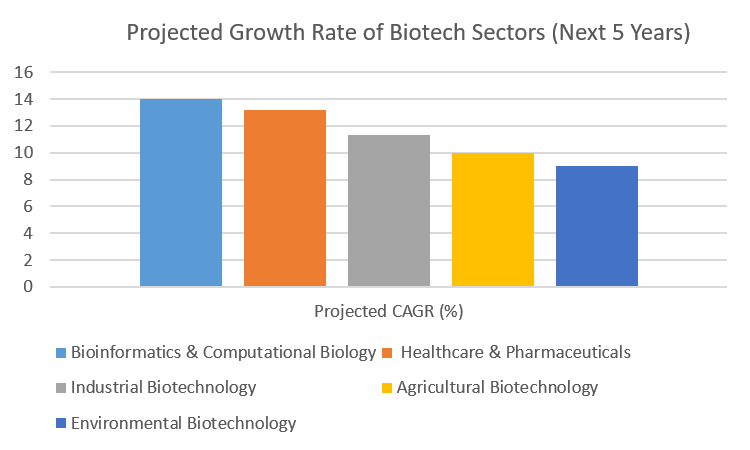Job Prospects in the Biotechnology Industry After Industrial Training
- Ajeet Singh
- Sep 30, 2025
- 3 min read
Updated: Oct 1, 2025
Biotechnology is one of the most dynamic and rapidly expanding industries in the world. From developing life-saving drugs to advancing sustainable agriculture, biotechnology touches almost every aspect of modern life. For students and professionals, undergoing industrial training in biotechnology is the gateway to understanding real-world applications of their academic knowledge and unlocking promising career opportunities.
The Major Sectors of the Biotechnology Industry
Biotechnology is a broad field that can be divided into several major sectors, each offering unique career pathways:
Healthcare & Pharmaceuticals (Biopharma)
Development of vaccines, monoclonal antibodies, diagnostics, and therapeutic drugs.
This is the largest sector of biotechnology, contributing around 45–50% of the global biotech market.
Roles: R&D Scientist, Quality Control Analyst, Bioprocess Associate, Clinical Researcher.
Agricultural Biotechnology
Focus on genetically modified crops, biofertilizers, biopesticides, and plant tissue culture.
Contributes approximately 15–20% of the biotech industry.
Roles: Plant Biotechnologist, Crop Scientist, Agricultural Product Developer.
Industrial Biotechnology
Use of microorganisms and enzymes for biofuels, bioplastics, detergents, and food processing.
Holds about 15% of the industry share globally.
Roles: Bioprocess Engineer, Fermentation Technologist, Production Executive.
Environmental Biotechnology
Development of bioremediation methods, waste treatment, and pollution control.
Around 8–10% share of the sector.
Roles: Environmental Consultant, Bioremediation Scientist, Wastewater Treatment Specialist.
Bioinformatics & Computational Biology
Application of software tools to analyze biological data, genomes, and proteomes.
Around 5–7% of the biotech industry, but growing rapidly with AI integration.
Roles: Bioinformatics Analyst, Computational Biologist, Data Scientist.

How Industrial Training Builds Job Readiness
Industrial training bridges the gap between theoretical learning and practical industry needs. Here’s how it helps:
Hands-On Training Skills: Training provides exposure to advanced techniques like PCR, cloning, chromatography, flow cytometry, and cell culture.
Industry Practices: Understanding GMP (Good Manufacturing Practices), GLP (Good Laboratory Practices), and regulatory frameworks.
Professional Development: Enhances teamwork, documentation, and problem-solving skills.
Networking: Training in reputed labs often leads to industry connections, internships, and references for future jobs.
Job Approach in the Biotechnology Industry
Breaking into the biotech industry requires a strategic approach:
Skill-Based CV – Highlight techniques and instruments mastered during industrial training.
Start with Internships/Project Work – Employers often hire trainees who have already worked in their labs.
Targeted Applications – Apply to companies in specific sectors that match your skills (biopharma, agriculture, industrial biotech).
Certifications & Courses – Additional certifications in Industrial Microbiology, Mediacal Microbiology, Food Biotechnology, Molecular Biology, Forensic Science, Medical Biotechnology, Cancer Biology, Animal Cell Culture, bioinformatics, clinical research, or regulatory affairs give an extra edge.
Networking & Conferences – Attending biotech seminars, career fairs, and workshops builds direct industry connections.
Job Prospects After Industrial Training
With proper industrial training, Project/Dessertation candidates can enter into diverse roles, such as:
Research Associate/Assistant
Molecular Biologist
Quality Control / Quality Assurance Executive
Bioprocess Associate / Production Officer
Clinical Research Coordinator
Bioinformatics Data Analyst
Technical Sales/Support Specialist

Career Outlook
The global biotechnology market is projected to grow at 12–14% CAGR in the next 5 years.
In India, the biotech sector is expected to reach $150 billion by 2025, making it one of the top five biotech hubs globally.
With industrial training, fresh graduates significantly improve their employability, as employers prefer hands-on trained candidates over purely academic backgrounds.
Final Thoughts
Industrial training in biotechnology serves as more than a mere educational opportunity—it is a springboard for a prosperous career. As the industry grows in healthcare, agriculture, environment, and industrial sectors, skilled professionals will have access to numerous opportunities. For students entering this field, receiving proper training now could lay the groundwork for future groundbreaking innovations.


Comments